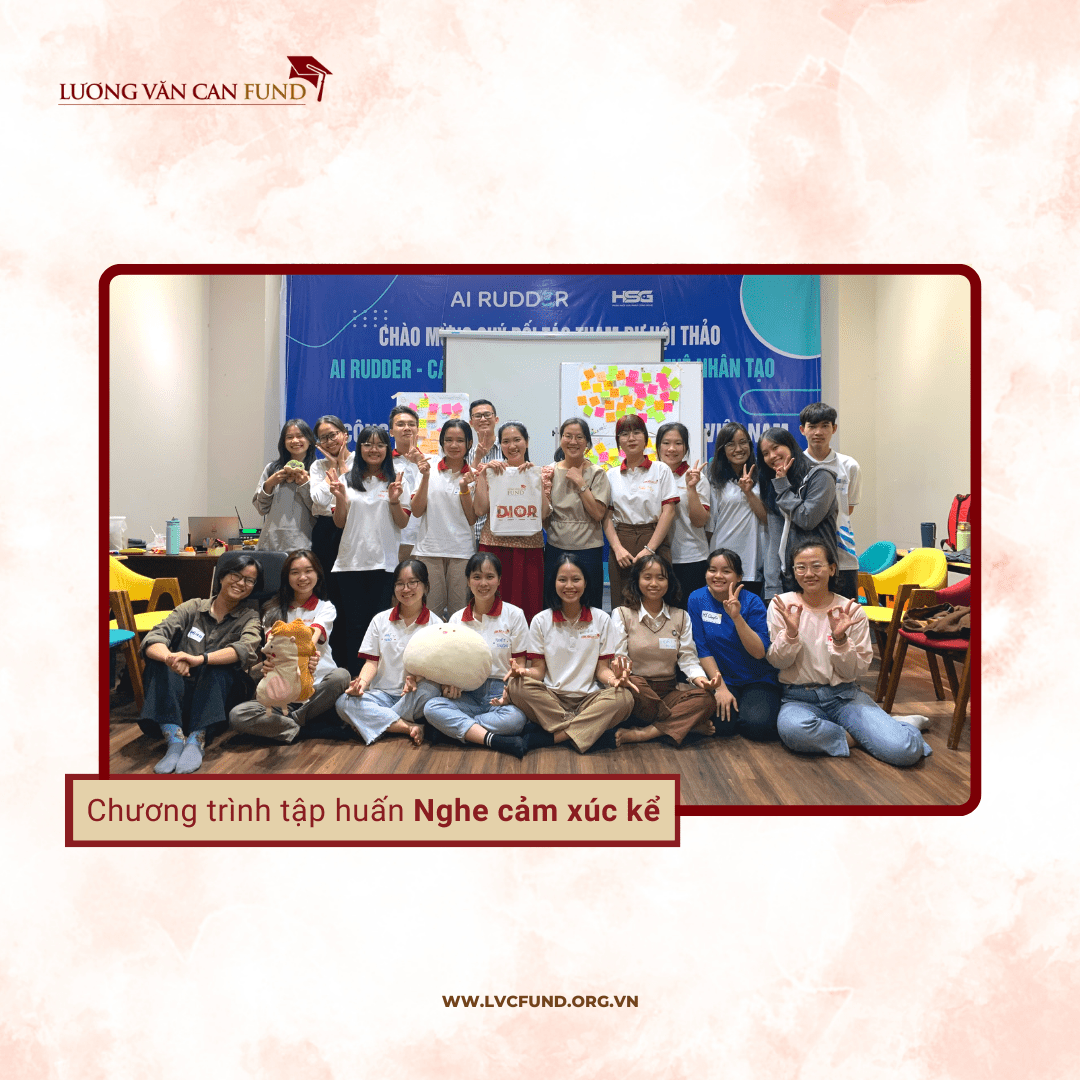Luong Van Can Fund Organized “Listening to the story of emotions” – 2nd Course, academic year 2022-2023
As the first run of the “Listening to the Story of Emotions” course was a success, this year, the Lương Văn Can Talent Support Fund, in collaboration with Menthy – a social enterprise working towards the mission of contributing to a generation of Vietnamese youth who understand, possess skills, and can take care of their mental health and that of others – is bringing it back. The course will be led by Ms. Nguyễn Phước Cát Phượng, MSc in Applied Psychology for the mental health of children and adolescents from the University of Edinburgh, Scotland, United Kingdom, and Ms. Trần Phan Tường Vy, who is holding a bachelor’s degree in psychology and majors in Psychotherapy and Counseling at the University of Social Sciences and Humanities, VNU-HCMC.
The goal of the second “Listening to the Story of Emotions” course is to provide students with knowledge about the important functions of emotions, describe the mechanisms of emotional operation, and apply emotional regulation strategies in life. After the program, students will be able to practice observing, describing, and labeling emotions, regulating and nurturing emotions with a responsible attitude towards their own thoughts, feelings, and behaviors, without self-judgment when experiencing inappropriate thoughts, feelings, and behaviors, and accepting emotions.
With the stated objectives, the course is designed to span six sessions with interconnected content, including:
- Session 1: Where do emotions come from?
- Session 2: Taking care of oneself
- Session 3: Understanding one’s needs
- Session 4: Thinking rationally
- Session 5: Letting go of strong emotions
- Session 6: Nurturing positive emotions
DAY 1: WHERE EMOTIONS COME FROM & HOW TO TAKE CARE OF YOURSELF
On the first day of class, students learn how to regulate their emotions by understanding the sources of emotions. To regulate emotions, students are guided through the practice of Mindfulness exercises, which support brain development and help them make wiser decisions. The speaker shares information about different types of hormones to explain the diversity of human emotions. It is emphasized that emotions are more peaceful when these hormones are in balance. To achieve this, students need to pay special attention to three pillars: sleep, nutrition, and physical activity.
In addition to Mindfulness exercises, students are instructed to practice mindful eating, body scanning, and emotional journaling. The participants of the course enthusiastically engage in these training challenges.
DAY 2: I UNDERSTAND MY NEEDS & THINK RATIONALLY
At the beginning of the second day, the speaker and students review the homework exercises and interesting lessons from the previous week. Through the speaker’s sharing, students gain an understanding of basic human needs, including the need for safety, connection, self-esteem, and higher needs such as exploration, love, purpose, and meaning.
Afterward, students are divided into four groups, each receiving a set of answers from the teacher. They collaborate to categorize the answers into different groups of positive and negative emotions. To eliminate negative emotions, four steps can be taken:
- Recognizing automatic negative thoughts
- Acknowledging and accepting them
- Soothing and rescuing the emotions
- Adjusting thoughts and seeking alternative perspectives
- The speaker advises the students: “If possible, express appreciation for the emotion and thank it for signaling your inner body.”
At the end of the day, students are given interesting homework exercises, which include:
- Continuing to practice healthy living challenges
- Recording “3 good things” each day
- Writing an emotion-based journal
DAY 3: RELEASE STRONG EMOTIONS & CULTIVATE POSITIVE EMOTIONS
As usual, to begin the class, the speaker reviewed the homework assignments and recapped the previous lessons with the students. Then, the students embarked on an emotional transformation journey consisting of three steps:
Step 1: Recognition
Step 2: Acceptance
Step 3: Transformation with the intention of detaching oneself from the emotions
The speaker guided emotional “First Aid” by applying the following five groups of methods:
- Group 1: Mindful S.T.O.P
- Group 2: Influencing the body in a healthy way
- Group 3: Releasing difficult emotions
- Group 4: Increase pleasant feelings
- Group 5: Temporarily setting emotions aside
In the long term, the speaker emphasized the importance of developing resilience through the following steps:
- Problem-solving
- Inner reflection
- Cultivating positive emotions
Ms. Phuong provided signs indicating the need for self-care. She also instructed several ways to nurture positive emotions, such as taking care of one’s body through proper eating, sleeping, and exercise; adopting a neutral and optimistic perspective; being attentive to and fulfilling personal needs; practicing gratitude; loving oneself, and engaging in activities one enjoys.
At the end of the session, the entire class was paired up to practice the exercises for the following month. Additionally, the students had the opportunity to share their impressions and thoughts throughout the course.

Through the “Listening to the Story of Emotions, 2nd Course,” the students gained a deep understanding of the mechanisms of emotions, practiced emotional exercises, and experienced a non-judgmental and emotionally accepting classroom environment. The Lương Văn Can Fund would like to express sincere gratitude to Ms. Nguyễn Phước Cát Phượng and Ms. Trần Phan Tường Vy for their continuous support in assisting students in achieving emotional balance and mental well-being. It is hoped that the students will maintain perseverance in applying effective emotional management mechanisms in their daily lives, allowing their souls to experience greater relief and tranquility.
Source: LVCF Media Team



